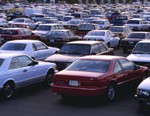Search Results
-
Alan (Heart) This Report
A year ago, Seattle Mayor Gregg Nickels assembled a “Green Ribbon Commission” to advise him on how to keep his trend-setting Kyoto pledge. Last week, the commission released its report. The global significance and political symbolism of the event have drawn much well-earned comment. The report itself has not. How is it? Superb. I’m in love. It’s well researched, innovative, and (mostly) courageous. (Full disclosure: the commission is also full...Read more » -
Rails to Trails to Economic Development?
Editor’s note: Guest contributor Hans Peter Meyer writes on community development issues from Courtenay, British Columbia. I have a dream, and last year’s “official opening” of the One Spot Trail here in the Vancouver Island’s Comox Valley is part of its realization. The “developed” part of the trail is about 6 kilometres long. It’s a multi-use trail for walkers, cyclists, and horseback riding that parallels Condensory Road for part of...Read more » -
Use Fuel Taxes Wisely
The gist: Make the price of driving tell the truth through fuel taxes that fund alternative transportation. The details: Drivers need roads, bridges, parking spaces, police, ambulances, and other services, but they pay only part of the associated costs through fuel taxes, vehicle registration and license fees, or parking charges. Taxpayers—regardless of how much they drive—pick up the rest of the tab. Most Northwest jurisdictions enshrine in law the principle...Read more » -
Hybrid Hype: Incentives Gone Wild
Hybrid cars are good for us, right? So policymakers should provide incentives—things like tax breaks, access to HOV lanes, and free parking for hybrid drivers. Well, not so fast, says a great article in today’s Washington Post. [Free registration req’d.] There’s growing reason to believe that those incentives for hybrids will make things worse—actually generating more gasoline use, not less. That’s because many of the incentives confuse the means for...Read more » -
Principles of the State of the Union Address
I hadn’t intended to join the cacaphony of bloggers and pundits who are Monday-morning-quarterbacking the State of the Union address. But Sightline’s all-star board member, Laura Retzler, asked a great question last night that I’ve been puzzling over since: what’s Sightline’s take on Bush’s plan to end the nation’s addiction to oil? It later occurred to me—too late to answer Laura—that my reply should have been rather obvious to me....Read more » -
Of Green Mayors and Red Queens
Not much new here, really, but still worth noting: from the Seattle P-I, "Seattle sets own Kyoto goals for emissions." To me, the thing that’s most noteworthy is the admission that, if greenhouse gas emissions are really going to fall in a city like Seattle, a lot of the reduction will have to come from the transportation sector. Seattle’s electricity is already, at least nominally, climate-neutral. Some gains can probably...Read more » -
Proposal to Legalize Granny Flats in SE Seattle
Good news on the smart-growth front: Seattle’s mayor is working on a pilot program to legalize granny flats in southeast Seattle. Currently residents of single-family neighborhoods can’t rent out extra space they may have in "detached accessory dwelling units", such as an apartment above their garage, although basement apartments are legal. Granny flats provide a variety of benefits. They increase density, supporting better transit and more services for the neighborhood....Read more » -
Sensors and Sensibility
This blog has been a bit obsessed both about the benefits of dynamichighwaytolling to controlcongestion, and about economic distortions caused by “free” parking. Apparently, our two pet obsessions have cross-bred, producing this San Fransisco Weekly article on dynamically-adjusted parking fees. Here’s the basic idea: new, inexpensive remote sensing technology is coming online that could… …precisely monitor activity in a city’s parking spaces, so a computer might figure out how much...Read more » -
Marketing with Trees
Urban ecologists are fond of reciting the benefits of trees in the big city: they reduce storm water runoff, absorb pollutants, increase real estate values, and make neighborhoods more attractive. But a recent study (pdf) shows that urban trees may have an unexpected bonus for city shopkeepers: apparently shoppers are willing to pay extra to shop near trees. UW professor Kathleen Wolf showed photos of retail streets with and without...Read more » -
Monorail: A Railroad or a High Road?
Seattle’s monorail project has smashed into the biggest bump in its bumpy history. This is hardly news anymore: the $2 billion 14-mile line will end up costing $11 billion, with $9 billion in interest payments, and the tax to fund it will extend until 2053. City hall and Olympia are, in short, freaking out. Read about it here, here, and here. There’s good reason to freak out. The monorail financing...Read more »


